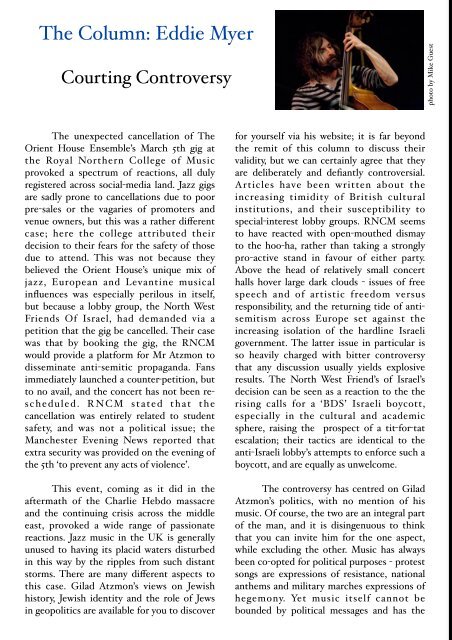You also want an ePaper? Increase the reach of your titles
YUMPU automatically turns print PDFs into web optimized ePapers that Google loves.
<strong>The</strong> Column: Eddie Myer<br />
Courting Controversy<br />
photo by Mike Guest<br />
<strong>The</strong> unexpected cancellation of <strong>The</strong><br />
Orient House Ensemble’s March 5th gig at<br />
the Royal Northern College of Music<br />
provoked a spectrum of reactions, all duly<br />
registered across social-media land. <strong>Jazz</strong> gigs<br />
are sadly prone to cancellations due to poor<br />
pre-sales or the vagaries of promoters and<br />
venue owners, but this was a rather different<br />
case; here the college attributed their<br />
decision to their fears for the safety of those<br />
due to attend. This was not because they<br />
believed the Orient House’s unique mix of<br />
jazz, European and Levantine musical<br />
influences was especially perilous in itself,<br />
but because a lobby group, the North West<br />
Friends Of Israel, had demanded via a<br />
petition that the gig be cancelled. <strong>The</strong>ir case<br />
was that by booking the gig, the RNCM<br />
would provide a platform for Mr Atzmon to<br />
disseminate anti-semitic propaganda. Fans<br />
immediately launched a counter-petition, but<br />
to no avail, and the concert has not been rescheduled.<br />
RNCM stated that the<br />
cancellation was entirely related to student<br />
safety, and was not a political issue; the<br />
Manchester Evening News reported that<br />
extra security was provided on the evening of<br />
the 5th ‘to prevent any acts of violence’.<br />
This event, coming as it did in the<br />
aftermath of the Charlie Hebdo massacre<br />
and the continuing crisis across the middle<br />
east, provoked a wide range of passionate<br />
reactions. <strong>Jazz</strong> music in the UK is generally<br />
unused to having its placid waters disturbed<br />
in this way by the ripples from such distant<br />
storms. <strong>The</strong>re are many different aspects to<br />
this case. Gilad Atzmon’s views on Jewish<br />
history, Jewish identity and the role of Jews<br />
in geopolitics are available for you to discover<br />
for yourself via his website; it is far beyond<br />
the remit of this column to discuss their<br />
validity, but we can certainly agree that they<br />
are deliberately and defiantly controversial.<br />
Articles have been written about the<br />
increasing timidity of British cultural<br />
institutions, and their susceptibility to<br />
special-interest lobby groups. RNCM seems<br />
to have reacted with open-mouthed dismay<br />
to the hoo-ha, rather than taking a strongly<br />
pro-active stand in favour of either party.<br />
Above the head of relatively small concert<br />
halls hover large dark clouds - issues of free<br />
speech and of artistic freedom versus<br />
responsibility, and the returning tide of antisemitism<br />
across Europe set against the<br />
increasing isolation of the hardline Israeli<br />
government. <strong>The</strong> latter issue in particular is<br />
so heavily charged with bitter controversy<br />
that any discussion usually yields explosive<br />
results. <strong>The</strong> North West Friend’s of Israel’s<br />
decision can be seen as a reaction to the the<br />
rising calls for a ‘BDS’ Israeli boycott,<br />
especially in the cultural and academic<br />
sphere, raising the prospect of a tit-for-tat<br />
escalation; their tactics are identical to the<br />
anti-Israeli lobby’s attempts to enforce such a<br />
boycott, and are equally as unwelcome.<br />
<strong>The</strong> controversy has centred on Gilad<br />
Atzmon’s politics, with no mention of his<br />
music. Of course, the two are an integral part<br />
of the man, and it is disingenuous to think<br />
that you can invite him for the one aspect,<br />
while excluding the other. Music has always<br />
been co-opted for political purposes - protest<br />
songs are expressions of resistance, national<br />
anthems and military marches expressions of<br />
hegemony. Yet music itself cannot be<br />
bounded by political messages and has the


